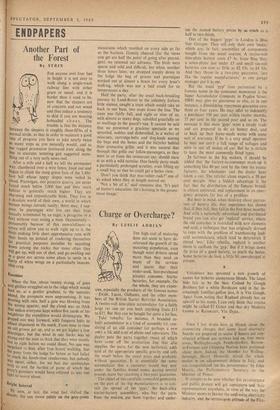Charge or Overcharge?
By LESLIE ADRIAN Take 'rebuilts,' for instance. A branded re- built accumulator is a kind of assembly kit, con- sisting of an old container (or perhaps a new one), a lid, and a set of plates and separators. The dealer puts the parts together (most of which have come off the production line that also supplies the parts for the new batteries), adds acid of the appropriate specific gravity and sells the result below the usual price and probably without guarantee. It is essentially the same accumulator that a customer would buy new under the familiar brand name, paying several pounds more but receiving a two-year guarantee.
The object of this carefully concealed generosity on the part of the big manufacturers is to con- tain the spread of the 'gyps,' the back-alley starter-battery assemblers, who buy the parts from the makers, put them together and under- cut the named battery prices by as much as a half to two-thirds.
One of the biggest 'gyps' in London is Blue Star Garages. They sell only their own 'make,' which are, in fact, assemblies of components bought from the usual sources. A twelve-volt nine-plate battery costs £7 4s. from Blue Star, a seven-plater just under £5 and small six-volt batteries can cost as little as £3 15s. to £4 12s. And -they throw: in a two-year guarantee, 'just like the regular manufacturers,' as one garage manager put it to me.
But the usual 'gyp' (one patronised by a famous name in: the consumer movement is the Super Accumulator Company in Pagden Street. SW8) may give no guarantee or else, as in one instance, a diminishing repayment guarantee over three or four years. He may offer to indemnify a purchaser 100 per cent within twelve months, 75 per cent in the second year and so on. The message is that most 'gyps' want. a steady trade and are prepared to do an honest deal, and to back up their home-made wares with some sort of warranty. If he is a very small operator he may not carry a full range of voltages and sizes to suit all makes of car. But he is certain to have the most commonly fitted types..
In fairness to the big makers, it should be added that the factory-to-consumer mark-up is something like 80 per cent by the time the manu- facturer, the wholesaler and the dealer have taken a cut. The retailer alone expects a 50 per cent margin. Also a hidden advantage is the fact that the distribution of the famous brands is almost universal, and replacement in an emer- gency presents far less of a problem.
But bear in mind, when thinking about guaran- tees of battery life, that experience has shown that, if they fail, they fail in the first three months. And with a nationally advertised and distributed brand you can also get 'replatal' service, where the old container is restocked with new elements and acid, a technique that was originally devised to cope with the problem of warehousing lead- acid accumulators, which tend to deteriorate if stored 'wet.' Like rebuilts, replatal is another move to outflank the 'gyp.' But if it brings down the price of a good battery, so much the better. Some batteries do look a little bit overcharged at present.
Viticulture has sprouted a new growth of names for hitherto anonymous blends. The latest bids fair to be the best. Coined by Gough Brothers for a white Bordeaux sold in the in- creasingly familiarIgallon jars, it is Vin Gough. Apart from noting that Raphael already has an aperitif to his name, I can only think that retsina might be called El Greco and that dry Madeira known as Rainwater, Vin Dyke.
*
Since 1 last wrote here in March about the connecting charges that some local electricity boards are prepared to waive if houses are con- structed without gas services laid on, tour more areas, Wellingborough. Pembrokeshire, Barrow- in-Furness and Chipping Norton have protested about them. Indeed, the Member for Welling- borough, Harrj. Howarth, raised the whole matter in an adjournment debate in July, and was congratulated 'on his perseverance' by John Morris, the Parliamentary Secretary to the Minister of Power.
It remains to be seen whether this perseverance
and public protest will get consumers and their representatives anywhere, in view of the way the Minister seems to favour the coal-using electricity industry, and the intransigent attitude of the Elec-
tricity Council, which seems unable to see any point of view but its own. I can see that every house must have electricity, as Mr. Morris pointed out, but it is the use of this inevitable fact as a weapon by one public utility against another that is objectionable. If natural gas is found in the North Sea, the battle could become fiercer and more wasteful than ever. When do we get a national fuel policy, Mr. Lee?































 Previous page
Previous page